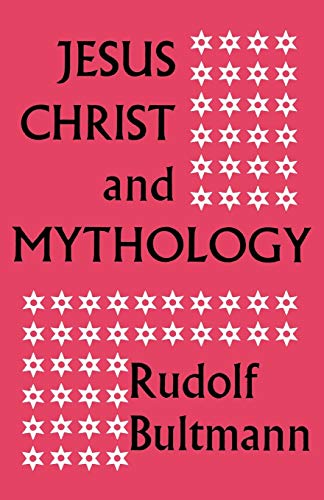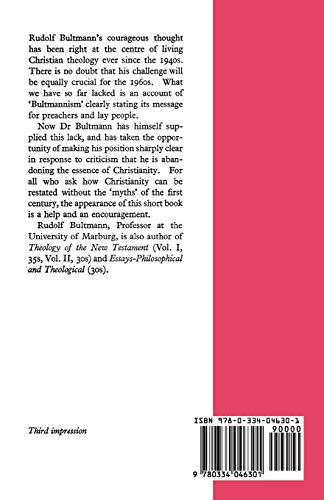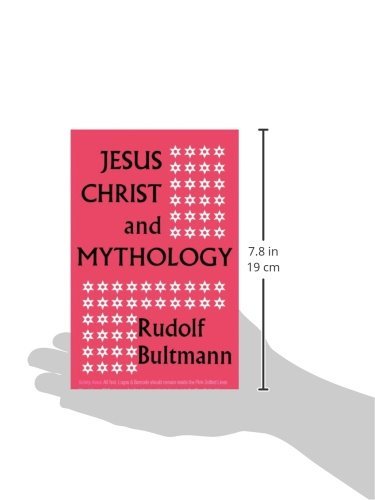Customer Services
Customer Support

Desert Online General Trading LLC
Warehouse # 7, 4th Street, Umm Ramool, Dubai, 30183, Dubai
Copyright © 2025 Desertcart Holdings Limited




Full description not available
B**R
The Book Was In Great Addition To My Bultmann Library
This book is a 1958 edition and it, along with the dust jacket, are in great condition. I am trying to amass as much of Rudolph Bultmann's writings as a can for a research thesis and this was an excellent addition to my library. The price was good and the delivery was right on time.
B**D
Very Good Introduction to Bultmann's Thought. Original in English
Rudolph Bultmann, Jesus Christ and Mythology (New York, Charles Scribner's Sons, 1958) Rudolph Bultmann (1884--1976) may be one of the two most important Protestant thinkers in the 20th century, carrying the Lutheran flag of modern scholarship alongside Karl Barth's conservative, Reform theology. This is remarkable in that there are so many excuses by which one could ignore Bultmann. The most obvious is in the title of this small book, a collection of lectures Bultmann delivered in 1951, in English, at over a dozen American colleges and universities, including Yale, Vanderbilt, and the Union Theological Seminary in New York City. Bultmann's whole scholarly enterprise has its foundation in the notion of mythology in the Judeo-Christian scriptures. But `myth' is one of those words that have strongly negative connotations, ranging from `fiction' to `devious falsehood'. The paradigm of a `myth' may be the ancient Greek stories about Achilles, Odysseus, Oedipus, Theseus, Jason, and Heracles, not to mention the gods such as Zeus, Hera, Poseidon, Hades, Athena, Apollo, Ares, and Aphrodite, most of whom had `loose' morals to say the least. The fog of meaning surrounding `myth' may clear up when we realize that these stories had the same objective and effect on the Greeks as the stories of Abraham and Isaac, and Jacob, and Joseph had on the Hebrews, and the effect of Jesus parables had on his disciples. A bridge between `myth' and `lesson' may be to consider Aesop's Fables (620--560 BCE). In one sense, these are pure fantasy, with talking foxes and racing hares and what have you. But all the stories have morals, and sometimes the morals are not that obvious, just as some of the lessons from Jesus' parables are not always obvious, or even more likely, open to interpretation in several different ways. For Bultmann, `demythologizing' was his word for adducing the message, the kerygma, behind the stories in the Bible, which were told in the context of the ancient middle East and the Greco-Roman world. This is nothing more nor less than Hermeneutics, the noble study of the meaning of Biblical texts in terms which a modern audience can understand. The passage in Luke 12:41--48 is a perfect example. It assumes that slavery is legitimate, and bases its lesson on the role of slaves. We have no trouble factoring out the fact of slavery and concentrating on the underlying eschatological lesson Jesus is teaching. Bultmann spells out how demythologizing involves interpreting the lessons for modern audiences without throwing the baby out with the bathwater. The fear Bultmann cites is that looking at the scripture so that it is consistent with, or, as our favorite TV forensic scientists like to say, `not inconsistent' with the modern world view, the Christian message will get lost. That is certainly easy to understand. Look at how aggressively creationists argue the story of Genesis against the evidence of modern Geology and Evolutionary Biology. What I suspect these folks don't realize is that they are shooting themselves in the foot. The OT creation stories are myths, pure and simple. And their moral has much less to do with which came first, the chicken or the egg, than it has to do with the nature of human evil. Bultmann is intent on our understanding the kerygma in modern language, seeing through the stories framed to be understood by people living 2000 to 2500 years ago. Just as Friedrich Schleiermacher said, hermeneutics is the art of avoiding misunderstanding. A second `naïve' objection to Bultmann is that his `point of view', clearly stated, in his exegesis, is the existential philosophy of Martin Heidegger. When I was studying philosophy in the Anglo-American curriculum dominated by Wittgenstein, Austin, and Russell, Existentialism wasn't even mentioned in classes, let alone discussed, except for brief segments in 20th Century Philosophy courses. Lots of attention was given to the Godfathers of Existentialism, Nietzsche and Kierkegaard. So why not go to the source. I got the impression that, like the `Post-moderns' of today, they were stretching a limited point of view too far. Of course, by now, Existentialism as an active doctrine has retired the field in favor of its stepchild, postmodernism. Another reason to relegate Bultmann's theories to history. A third reason is that as one reads material on subjects on which Bultmann had a big influence, such as the interpretation of the Synoptic Gospels, you find a lot of modern scholars finding things with which they disagree with Bultmann. This gives one the feeling that his scholarship is passé. But, while Bultmann's exegesis of details may be superseded, I suspect his theology and especially his methods of exegesis are still good today as a guide to approaching the scriptures with the right frame of mind. With regard to the first two concerns, this little book may not plumb the full depth of Bultmann's thought (he wrote a great deal), but it will certainly dispel apprehensions that Bultmann and those who followed his thought are intent on either `debunking' Christianity or applying an inappropriate gauge to interpreting the Scriptures. One of Bultmann's primary tenants is that one should not approach an understanding of the Scripture with the intent to find support for particular dogmas. The Scriptures need to speak with their own voice.
P**S
Great read as everything done by this outstanding German scholar
Bultmann's commentary on mythological connotations in the New Testament. Great read as everything done by this outstanding German scholar.
R**Y
Five Stars
Great insight into the thinking of an outstanding liberal theologian.
A**R
Five Stars
none
W**S
Truth through myth
Well written and well argued. I found it hard to put down. It illuminated many things about Christian belief.
H**N
OK
It was about what I execed. The book let me come familiar with Bultmann. I've read a lot of books aobut Jesus but Bultmann was new to me. Hugh Nicholson
J**E
A Clear Portrait of Bultmann's Theology
Jesus Christ and Mythology consists of two groups of lectures Bultmann gave at Yale and Vanderbilt in 1951, and since the lectures were aimed at intelligent students unaquanted with his work, they serve as an excellent introduction to Bultmann's theology. I had read a good deal about Bultmann's thought in other theology books, but this was the first of his actual works I read, and it was certainly worth reading.Bultmann's primary point is that God is not comprehended by thought, but by experience. Rationality is not the tool for approaching God; relational experience is. There are essentially two spheres of existence (derived from Kant); the rational, ordered external world which we understand via science, and the a-rational world including the supernatural (including God, "faith knowledge, etc.) which we understand via experience and faith. Jesus was indeed a historical person existing in the first sphere of existence, but he is the Jesus Christ of Christianity only in the second sphere, which has nothing to do with rationality. As Bultmann says, " The incomprehensibility of God lies not in the sphere of theorical thought but in the sphere of personal existence" (43 [note that I have the 1958 edition]).What does this have to do with mythology? The scriptural account of Jesus is clouded in mythology. The entire world-view of the ancient authors of the New Testament is now rejected as primitive by modern men, so we must go about the task of de-mythologizing (stripping the myth from reality) Jesus to discover who he truly was. This de-mythologizing is Bultmann's proposed hermeneutic method (45). But we are not doing this for knowledge of the first sphere. We want to "understand in a new way the concept of knowledge which as a rule does not mean theoretical, rational knowledge, but mystical intuition or vision, a mystical union with Christ" (48). Bultmann delves into existential philosophy to tie together this search for mystical truth with the search for self knowledge. He ends up concluding that "the question of God and the question of myself are identical" (53). We study history (in this case, we de-mythologize New Testament history) to "gain an understanding of the possibilities of human life and thereby of the possibilities of my own life. The ultimate reason for studying history is to become conscious of the possibilities of human existence" (53).Of course, since all of this is happenining in the non-objective, a-rational second sphere of existence, we have nothing even resembling certainty. We can literally have no rational reason whatsoever for believing what we do about what is going in the realm of faith, for the two spheres of existence are utterly divided. This also means that God cannot be acting in human history, for God is of the second sphere and human history (or natural history) is of the first sphere. Of course, Bultmann needs God to be acting in some way to justify even his extremely liberal version of Christianity, so he finds his solution in a very unconvincince explanation; God acts "within" worldly events, not actually changing anything or effecting anything. As he says, "The thought of the action of God as an unworldy and transcendent action can be protected from misunderstanding only if it is not thought of as an action which happens between the worldy actions or events, but as happening within them. The close connection between natural and historical events remains intact as it presents itself to the observer. The action of God is hidden from every eye except the eye of faith... It is within them [natural events] that God's hidden action is taking place" (61-62). In other words, God is not actually causing anything in the natural world, but through faith we can understand him to be working. This not only leaves one with the severely unsettling conclusion that everything would have turned out exactly the same if God did not even exist (since he isn't actually causing anything in the physical world), but it also rules out miracles (65-66), as God cannot be encountered in the physical sphere of existence. It is only through experince that we can speak of God acting. "Only such statements about God are legitimate as express the existential relation between God and man. Statements which speak of God's actions as cosmic events are illegitimate" (69). This includes the crucifixion as atonement (69-70).In short, God is not to be comprehended by reason, and does not operate in the physical world as a causal agent in any sense of the term. Jesus Christ is a messianic figure of truth only in the realm of faith and mystical experience, which is not built upon historical reality. If we believe in Christ, it is not for any reason, but is in spite of reason. In fact, we do not even believe because of experience. "We can believe in God only in spite of experience," for "God withholds himself from view and observation" (84). We are to define nothing, aviod systematic theology like the plague, and trust in Christ as the Lord of the faith realm, although it is never really clear what exactly Christ does, or how he is messianic in any way since Bultmann took away all the historical importance attached to him.While I very strongly disagree with nearly all of Bultmann's main points (I lean toward orthodox Christianity), this is definitely a book worth reading. Bultmann is very clear (except a few times he delves into existential philosophy and gets a bit vague), very intelligent, and very influential. This book will provide a very useful introduction to the theology of a prominent figure in 20th century theology and hermeneutics. Whether you agree with him or not, he needs to be dealt with, and this books is a good a place as any to begin to tackle the issues he raises. His theology is, I think, the intellectual pinnacle of what theology should look like if we accept Kant's dichotomization of reality into separate shperes of knowledge. The question is, of course, whether we accept that or not.
F**S
Five Stars
Very pleased with book and service
Trustpilot
3 weeks ago
5 days ago